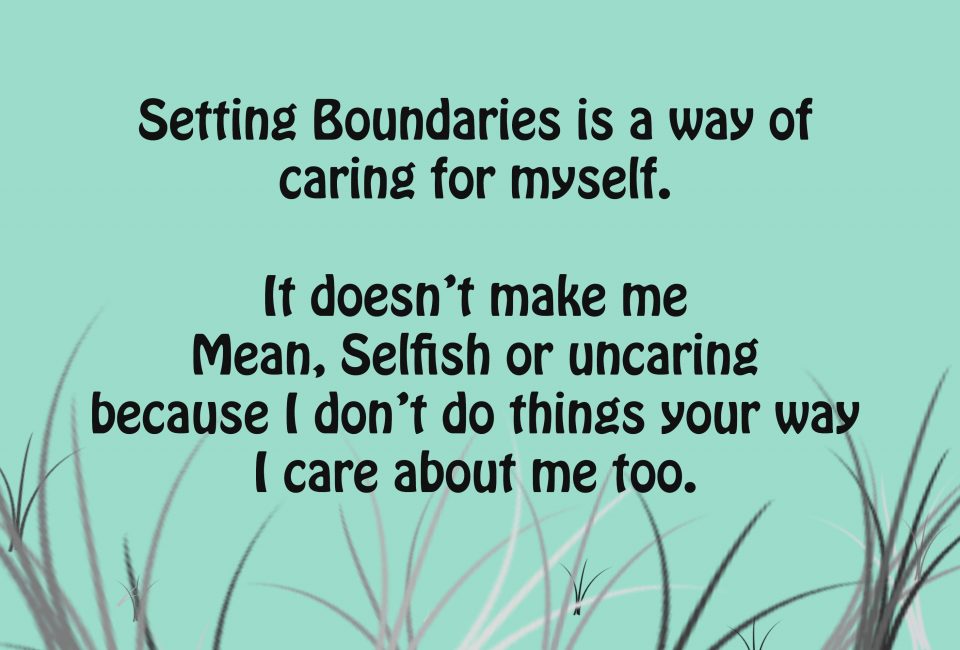By Sharon Martin, LCSW
We all need boundaries.
Boundaries keep us safe.
Boundaries differentiate me from you.
Yes! Boundaries help us focus on whats most important to us.
And boundaries improve relationships by creating clear expectations and responsibilities.
But it can be hard to figure out what boundaries you need to set.
If you’re living with Depression, join others who understand what you’re going through. Discover a safe space to find community, guidance, and support together.
What boundaries do you need?
One way to identify your boundaries is to think about the areas of your life where youre experiencing problems. Do you constantly feel exhausted? Do you feel uncomfortable around your coworker Kevin? Or do you feel resentful of your mothers intrusions? Each of these problems is telling you that youre lacking boundaries in this area of your life.
I’ve identified seven common types of boundaries. Understanding each type can help you clarify the specific boundaries that you may need.
Physical boundaries protect your space and body, your right to not be touched, to have privacy, and to meet your physical needs such as resting or eating. They tell others how close they can get to you, what kind of physical touch (if any) is okay, how much privacy you need, and how to behave in your personal space. A physical boundary clearly defines that your body and personal space belong to you.
Examples:
When someone sits uncomfortably close to you, you move away or say, I need a little more personal space.
We don’t keep or consume alcohol at our house.
2) Sexual Boundaries
Sexual boundaries protect your right to consent, to ask for what you like sexually, and to honesty about your partners sexual history. They define what kind of sexual touch and intimacy you want, how often, when, where, and with whom.
Examples:
I’d like to be touched like this.
Thuy has a personal policy of not having sex on the first date.
3) Emotional or Mental Boundaries
Emotional or mental boundaries protect your right to have your own feelings and thoughts, to not have your feelings criticized or invalidated, and not have to take care of other people’s feelings. Emotional boundaries differentiate your feelings from other peoples, so youre accountable for your own feelings, but not responsible for how others feel. And emotional boundaries also allow us to create emotional safety by respecting each other’s feelings, not oversharing personal information thats inappropriate for the nature or level of closeness in the relationship.
Examples:
I don’t feel comfortable discussing this.
I feel embarrassed and powerless when you chastise me in front of our kids. Id like you to stop.
Related: Boundaries are the key to co-parenting after a divorce
4) Spiritual or Religious Boundaries
Spiritual boundaries protect your right to believe in what you want, worship as you wish, and practice your spiritual or religious beliefs.
Examples:
Im going to take a moment and say a silent prayer before we eat.
Paul goes to church alone because his partner doesn’t share his beliefs.
5) Financial and Material Boundaries
Financial and material boundaries protect your financial resources and possessions, your right to spend your money as you choose, to not give or loan your money or possessions if you don’t want to, and your right to be paid by an employer as agreed.
Examples:
I’m on a budget, so I brought my lunch from home and wont be ordering lunch today.
Please don’t borrow my car without asking.

6) Time Boundaries
Time boundaries protect how you spend your time. They protect you from agreeing to do things you don’t want to do, having people waste your time, and being overworked.
Examples:
I reserve my evenings for family time. I’ll respond to all work emails first thing in the morning.
Dad, I don’t have time to take you shopping this week. Ill place an order for you with the grocery delivery service.
7) Non-Negotiable Boundaries
Non-negotiable boundaries are deal-breakers, things that you absolutely must have in order to feel safe. They usually pertain to safety issues such as physical violence, emotional abuse, drug or alcohol use, fidelity, and life-threatening health issues.
Examples:
Mom, if you don’t install a fence around your pool, my children will not be able to come to your house.
Infidelity is a deal-breaker for me and I will not continue in this relationship if you cheat on me.
We all need some non-negotiable boundaries, but we also need to be careful that we don’t put too many of our boundaries into this category. If a non-negotiable boundary is going to have any meaning, you have to be willing to follow through on it. Its counter-productive to set non-negotiable boundaries that you don’t enforce.
After reading about the seven types of boundaries, I hope you gained greater clarity about the boundaries you need to set. I encourage you to write them down so that you can hold yourself accountable for creating boundaries to protect yourself, maintain (or establish) your individuality, and ensure that you use your time, energy, and resources for what matters most to you.


[…] 7 Types of Boundaries You May Need – Black Source Media […]